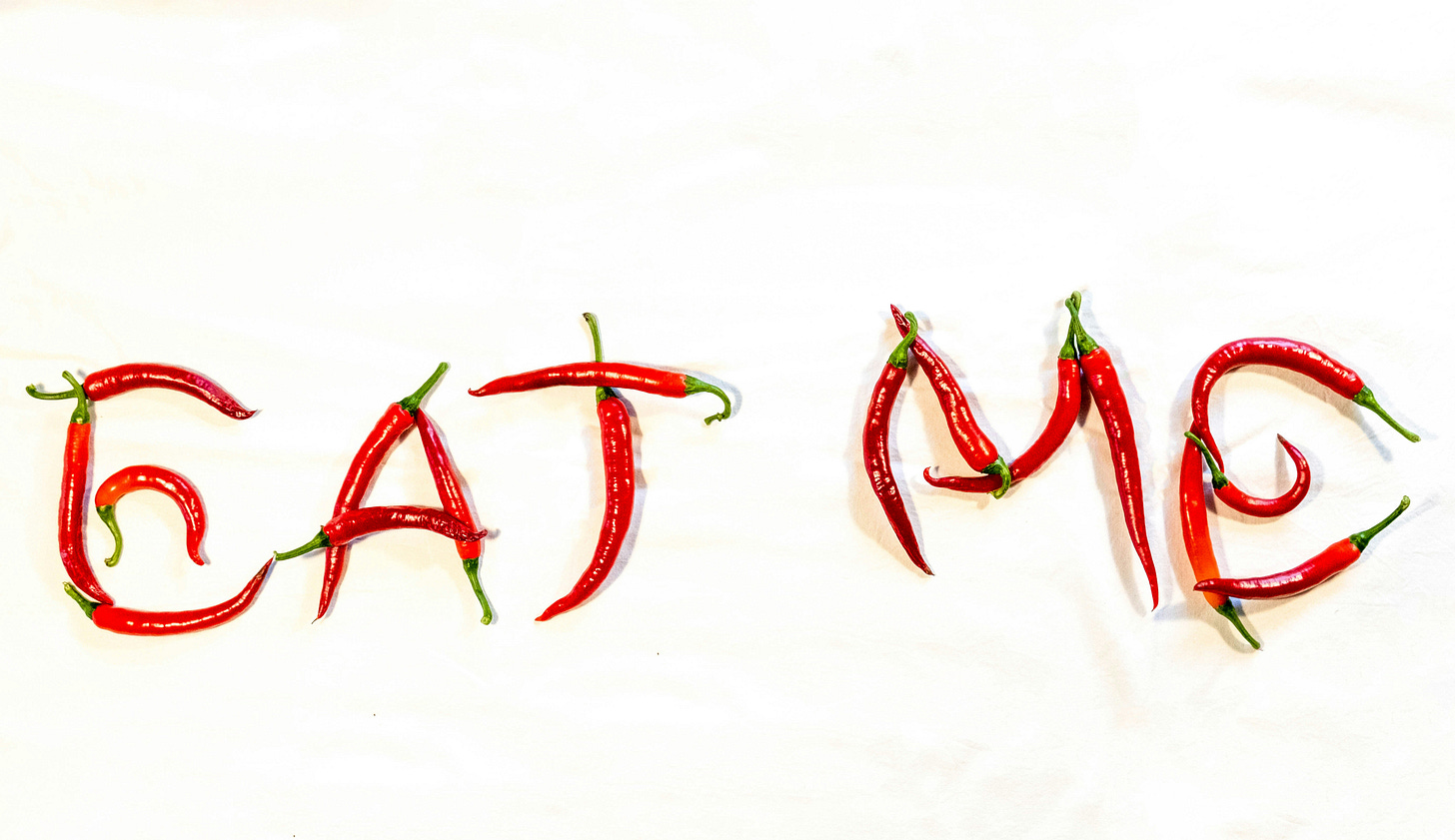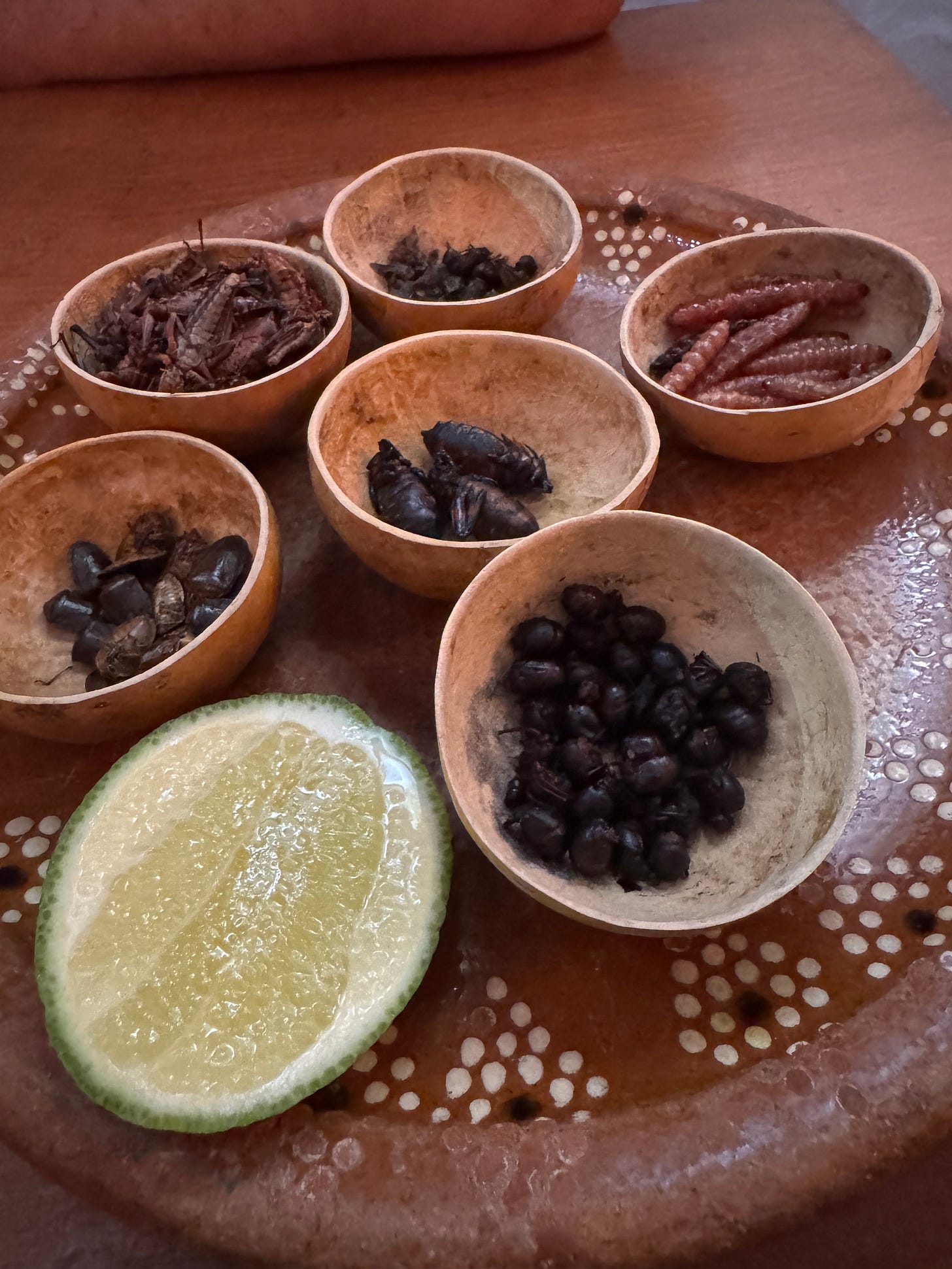Exotic Appetites: What Your Food Choices Reveal About Your Sex Life 🍱
Plus, the science-backed recommendation of what you should order on your first date.
Welcome back to The Sex Report 🧬 by Misseducated, where I apply insights from science to sex1 💌 ✍️
Background 🦗
“What do you think of chapulines?” José asked me in Spanish as he eyed me across the table. I had just sat down with him at his bar in the Juarez neighborhood of Mexico City, twenty minutes into our first date after matching on Bumble. Chapulines, of course, are the Mexican delicacy better known in English as “grasshoppers”. He wanted to order some with guacamole, a quintessential local dish.
“I love chapulines,” I said. It was the truth. Yet José had just spent at least five minutes telling me about the 46 varieties of mezcal and various fermented beverages spanning states across Mexico that he offers at his bar. I wondered where he was going with this. He continued,
“Have you tried any other insects?”
I paused. My mouth crept into a knowing smile. The deafening sounds of people at other tables enjoying their mezcal weren’t loud enough to drown out the one thing I was thinking to myself:
You can’t make this shit up.
Key Terms 💡
Food neophobia - A person’s dislike for trying new foods, i.e., a picky eater.
Food neophilia - A person’s love of trying new foods.
Analysis 🤓
Read the full study here 🔗 👩🔬.
Just an hour before our date, I’d read a four-part study called “You are what you (are willing to) eat: Willingness to try new foods impacts perceptions of sexual unrestrictedness and desirability”2. I had gotten a handle on the researcher's findings, but when it came to relating them to my personal experience, I was stumped. Talking about my French ex’s delicious Quiche Lorraine didn’t quite fit the narrative. And then, I kid you not, this literally happens.
Here's the four-part Q&A I'd just learned from reading this combined study:
🧐 Is a potential mate who is willing to try new foods, versus being reluctant to try them, perceived as a more desirable sex and romantic partner? (Study 1)
Yes, the researchers found that potential mates “who are more willing to try new foods are perceived to be more desirable and sexually unrestricted than those who are reluctant to try new foods.”
💖 What does a potential mate’s willingness or reluctance to try new foods signal about their love life? (Study 2)
Potential mates who were willing to try new foods were seen as being more open to short-term, non-committed romantic relationships, having had a higher number of previous sexual partners, and being more likely to embrace novelty.
This echoed a previous finding in a 2012 study, where they surveyed 4,000 single men and women and discovered that the majority of people find food neophobia to be a turnoff3. Other research has found that being a picky eater is related to reduced risk-taking4 and lower levels of the personality trait of openness5.
📚 Does this sexual openness depend on other factors aside from food, such as a willingness to try new things like books, TV, music, and experiences? (Study 3)
Nope. Being willing to try new foods is the only aspect of novelty that has this effect. If a potential mate was open to trying new experiences, for example, but they weren’t open to trying new foods, they were still seen as sexually restricted.
💦 What exactly is it about being willing to try new foods that turns people on? (Study 4)
Potential mates who liked trying new foods were seen to be less likely to be turned off by exploring new sexual things. Basically, they had what the researchers described as “less sexual disgust”. It had nothing to do with the potential mate getting sick often or not, being physically healthier, or being stronger.
Conclusion 📊
The bottom line of the researchers' findings was this:
“Across four studies, we find evidence that one's willingness to try new foods provides cues to one's desirability and sexual unrestrictedness...which may influence mate choice decisions.”
The Tash Translation for this in my mind is: “If this guy/girl I’m interested in is willing to try new foods, they’re open to tasting new things. They've never tasted me before or eaten me out. I mean, they might not like it, but at least they might be willing to try it. And heck, maybe that’d even eat my ass. Wouldn’t that be hot?”
Of course, the researchers added that: “it may be the case that people order more exotic or novel foods in situations where they want to be seen as more desirable or sexually unrestricted and order more familiar foods in situations where they want to be seen as less desirable or sexually unrestricted.”
So basically, armed with this information, I might go out of my way to show a potential mate on a date that I was willing to try new foods, so that they would perceive me as being more sexually open. Lol, okay fine. I'm caught red-handed.
Impact 🤣
I looked up at José, fully aware of everything I had learned from the research that day. I smiled at him.
“I’d love to try some new insects,” I said. Since I like chapulines so much, I was curious to see what the other insects tasted like. Here's the real photo and video evidence from yesterday. The sticky-like speckled thing I'm eating is an actual chrysalis from a certain type of butterfly that's incredibly rare. It tasted like a piece of chewy meat.
Behind The Scenes With Tash 🎬
In the future, I might put this "Behind The Scenes With Tash" content behind the paywall, but for now, it's free.
How did I find this study? Truth be told, I’ve been working on Clue’s Content Strategy for a while now, and one of our darndest competitors, Natural Cycles, has been killing it in the content game. This week, while I was enviously scrolling through Natural Cycles' employees on LinkedIn, I stumbled across Dr. Hill’s LinkedIn page. She’s a professor of psychology at Texas Christian University. From her website, I discovered she's an awesome researcher with one heck of a tagline: “Psychologist advancing the science of women.”
I obviously began salivating as soon as I read that, and that was before I found the page on her website with all the peer-reviewed, primary research studies she’s written and contributed to! From the list of 20 or so journal publications she has listed there, I found this four-part study about food and sexual openness the funniest and the most fascinating. I'm so glad I got to share it with you!
So, do you like to try new foods? Or could you see yourself ordering some exotic food on the first date, to signal to your potential mate that you're more sexually open? Paid subscribers can share their experiences in the comments!
Thank you for reading. I hope you enjoyed this week's article, and that you have a great weekend.
Love,
Tash
💌 ✍️
I didn’t come up with this phrase. My comedian friend, Emilia Barosse, did!
Hannah K. Bradshaw, Summer Mengelkoch, Matthew Espinosa, Alex Darrell, Sarah E. Hill. (2021). You are what you (are willing to) eat: Willingness to try new foods impacts perceptions of sexual unrestrictedness and desirability. Retrieved May 16, 2025, from sarahehill.com/wp-content/uploads/publications/BradshawEtAl_2021.pdf
IAC. (2012, July 02). Love Bites: TODAY.com And Match.com Survey Reveals Singles' Attitudes On Dining And Dating. [Press release]. Retrieved May 16, 2025, from https://www.nbcnews.com/id/wbna48049100
Alley, T. R., & Potter, K. A. (2011). Food neophobia and sensation seeking. In Handbook of behavior, food and nutrition (pp. 707–724). New York, NY: Springer.
Knaapila, A., Silventoinen, K., Broms, U., Rose, R. J., Perola, M., Kaprio, J., & Tuorila, H. M. (2011). Food neophobia in young adults: Genetic architecture and relation to personality, pleasantness and use frequency of foods, and body mass index—A twin study. Behavior Genetics, 41(4), 512–521.







If you ever find yourself in Gloucester Ma USA, I highly recommend the Portuguese restaurant 'The Azorean'. The food is excellent with many authentic dishes to try. I had Octopus cooked in olive oil and a side of potatoes. Perfecto!